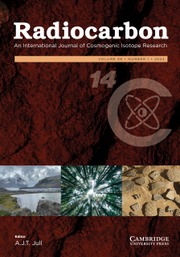Crossref Citations
This article has been cited by the following publications. This list is generated based on data provided by
Crossref.
Molnár, Dávid
Sümegi, Pál
Makó, László
Cseh, Péter
Zeeden, Christian
Nett, Janina
Lehmkuhl, Frank
Törőcsik, Tünde
and
Sümegi, Balázs P.
2021.
Palaeoecological background of the Upper Palaeolithic site of Ságvár, Hungary: radiocarbon‐dated malacological and sedimentological studies on the Late Pleistocene environment.
Journal of Quaternary Science,
Vol. 36,
Issue. 8,
p.
1353.
Sümegi, Pál
Gulyás, Sándor
Molnár, Dávid
Bozsó, Gábor
Fekete, István
Makó, László
Cseh, Péter
Molnár, Mihály
Sümegi, Balázs P.
Almond, Peter
Zeeden, Christian
Törőcsik, Tünde
Nett, Janina J.
Markó, András
and
Lehmkuhl, Frank
2021.
New chronology and extended palaeoenvironmental data to the 1975 loess profile of Madaras brickyard, South Hungary.
Journal of Quaternary Science,
Vol. 36,
Issue. 8,
p.
1364.
Scheidt, Stephanie
Berg, Sonja
Hambach, Ulrich
Klasen, Nicole
Pötter, Stephan
Stolz, Alexander
Veres, Daniel
Zeeden, Christian
Brill, Dominik
Brückner, Helmut
Kusch, Stephanie
Laag, Christian
Lehmkuhl, Frank
Melles, Martin
Monnens, Florian
Oppermann, Lukas
Rethemeyer, Janet
and
Nett, Janina J.
2021.
Chronological Assessment of the Balta Alba Kurgan Loess-Paleosol Section (Romania) – A Comparative Study on Different Dating Methods for a Robust and Precise Age Model.
Frontiers in Earth Science,
Vol. 8,
Issue. ,
Makó, László
Molnár, Dávid
Runa, Boglárka
Bozsó, Gábor
Cseh, Péter
Nagy, Balázs
and
Sümegi, Pál
2021.
Selected Grain-Size and Geochemical Analyses of the Loess-Paleosol Sequence of Pécel (Northern Hungary): An Attempt to Determine Sediment Accumulation Conditions and the Source Area Location.
Quaternary,
Vol. 4,
Issue. 2,
p.
17.
Sümegi, Pál
and
Gulyás, Sándor
2021.
Some notes on the interpretation and reliability of malacological proxies in paleotemperature reconstructions from loess- comments to Obreht et al.'s “A critical reevaluation of paleoclimate proxy records from loess in the Carpathian Basin”.
Earth-Science Reviews,
Vol. 221,
Issue. ,
p.
103675.
Lengyel, György
Bárány, Annamária
Béres, Sándor
Cserpák, Ferenc
Gasparik, Mihály
Major, István
Molnár, Mihály
Nadachowski, Adam
Nemergut, Adrián
Svoboda, Jiří
Verpoorte, Alexander
Wojtal, Piotr
and
Wilczyński, Jarosław
2021.
The Epigravettian chronology and the human population of eastern Central Europe during MIS2.
Quaternary Science Reviews,
Vol. 271,
Issue. ,
p.
107187.
Ludwig, Patrick
Gavrilov, Milivoj B.
Radaković, Milica G.
and
Marković, Slobodan B.
2021.
Malaco temperature reconstructions and numerical simulation of environmental conditions in the southeastern Carpathian Basin during the Last Glacial Maximum.
Journal of Quaternary Science,
Vol. 36,
Issue. 8,
p.
1426.
Sümegi, Pál
Molnár, Dávid
Náfrádi, Katalin
Makó, László
Cseh, Péter
Törőcsik, Tünde
Molnár, Mihály
and
Zhou, Liping
2022.
Vegetation and land snail-based reconstruction of the palaeocological changes in the forest steppe eco-region of the Carpathian Basin during last glacial warming.
Global Ecology and Conservation,
Vol. 33,
Issue. ,
p.
e01976.
Sümegi, Pál
Molnár, Dávid
Gulyás, Sándor
Stevens, Thomas
Makó, László
Cseh, Péter
Molnár, Mihály
Fitzsimmons, Kathryn
Nett, Janina J.
Hlavatskyi, Dmytro
and
Lehmkuhl, Frank
2022.
Comparison of High-Resolution 14C and Luminescence-Based Chronologies of the MIS 2 Madaras Loess/Paleosol Sequence, Hungary: Implications for Chronological Studies.
Quaternary,
Vol. 5,
Issue. 4,
p.
47.
Makó, László
Cseh, Péter
Nagy, Balázs
Sümegi, Pál
and
Molnár, Dávid
2023.
Development History of the Loess–Paleosol Profiles of Pécel, Kisdorog and Bonyhádvarasd, Hungary.
Quaternary,
Vol. 6,
Issue. 3,
p.
38.
Bosq, Mathieu
Kreutzer, Sebastian
Bertran, Pascal
Lanos, Philippe
Dufresne, Philippe
and
Schmidt, Christoph
2023.
Last Glacial loess in Europe: luminescence database and chronology of deposition.
Earth System Science Data,
Vol. 15,
Issue. 10,
p.
4689.
Sørensen, Aske L.
Hansen, Thomas M.
Nørgaard, Jesper
Buylaert, Jan-Pieter
Murray, Andrew S.
Kulakova, Ekaterina
Kurbanov, Redzhep
and
Knudsen, Mads F.
2024.
CosmoChron: A versatile age-depth modeling approach using cosmogenic nuclides and direct age constraints.
Quaternary Geochronology,
Vol. 85,
Issue. ,
p.
101618.
Molnár, Dávid
Makó, László
Molnár, Mihály
and
Sümegi, Pál
2024.
Case Study from Máza Brickyard (SW-Hungary): Paleoecology and Sediment Accumulation Changes in the Southern Part of the Carpathian Basin.
Quaternary,
Vol. 7,
Issue. 3,
p.
35.
Perić, Zoran M.
Radaković, Milica G.
Marković, Rastko S.
and
Marković, Slobodan B.
2025.
A synthesis of luminescence and 14C dated dust mass accumulation rates for loess‐palaeosol sequences from the Middle Danube Basin.
Boreas,
Sebe, Krisztina
Józsa, Sándor
Lukács, Réka
Surányi, Gergely
Harangi, Szabolcs
and
Novothny, Ágnes
2025.
The preservation potential of loess in low-elevation mountains (Mecsek Mountains, Hungary).
Quaternary Research,
p.
1.


